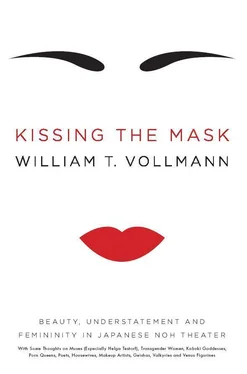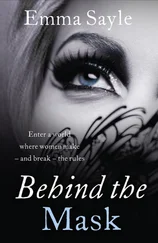“I think that men are often pretty comfortable with a double standard,” she went on. “They can have a wandering eye but can feel insulted if their woman is found attractive by another man. I also just feel sorry for them. There is a societal influence that they have to know their power to be accepted, that they have to prove themselves professionally, and it really is depressing for a man to feel that he doesn’t have anything to show for himself, whereas a woman can simply be .”
Now came my final question: “Who or what are you as a female body?”
Hilary had said that she felt at a disadvantage because society encouraged her to be a giver instead of a receiver. But from an anatomical point of view, she was a receiver. I’ve often wondered to what extent the penetration of a woman, with its associated rhythm, force and duration, which in so many positions she can control only indirectly, through communication with the man, affects the way she thinks and feels. Obviously the woman can ride the man and control almost the entire experience of copulation in that way, but the fact remains that a flaccid penis is a greater barrier to intercourse than a dry vagina, which must be one reason why rape is more often committed by men against women than the reverse. Mouths, tongues, hands, buttocks and other pleasure-accessories possessed by both sexes can certainly take on their own primacy in an act of lovemaking; all the same, the core of the heterosexual coupling experience is the interaction of the complementary genitalia.
Hilary said: “I think that women can be okay with that controlling part, just by doing more of the moving, but women have always had to be okay with that, and when you’re not in synch with it, it can be very offputting. I’ve said that women are taught to be acquiescent, and I do think that there is gender role-playing in bed. Just mentally there is a kind of an external persona that you invest in. My best relationships have been pretty well matched and equal. I think I’ve been pretty much the initiator. I do think that having a certain amount of sexual persona, letting those elements of self to come out, adds to the enthusiasm, even if they’re stereotyped and even if people wouldn’t want to necessarily talk about them out of bed.”
“To what extent do you think that the fact that your body gets penetrated defines you personally?”
“I definitely think that it has a huge impact. Being a receiver, taking someone into a very sacred place and in the most intimate position, you do feel that there has to be trust. You do feel that you’ve given so much that you expect gratitude.”
I said to Hilary that there often seemed to be miscommunication between the sexes over this matter of gratitude. Some men I know have expressed bitterness to me that after a sexual act in which both they and the women concerned achieve orgasm, the women seem to feel that the men should feel indebted to them.
“I do feel that women give so much to let a man inside,” said Hilary. “I do grant that women can be less giving than they should be; they can be passive. And they could be more grateful themselves. I can be. But I do feel, the first time especially, that it’s so sacred.”
“And when would you say that the man’s gratitude becomes less of an issue for the woman?”
“I imagine that the comfort level determines it. The women need to create the rhythm so it won’t be as if they’re vulnerable to the man’s dominance.”
“Since your female body affects who you are, can you imagine yourself as a ninety-year-old woman and tell me how your femininity will express itself then?”
“I do think that a very big sense of self for me is recognizing my attraction. And I live in a very social scene, so it’s all about exchanging attractiveness and being recognized. I know that that goes away. So what will go away? I definitely want to make a contribution and feel that I am appreciated by what I can offer: to support people emotionally and every other way. I’m not really involved in volunteer efforts these days, but I would like to seek that out and give some kindness. That would be a critical part of still feeling useful. One thing comforts me: I think there are different ways when we are in touch with our sensuality, and not just through sexuality itself. I’m not a painter but I do feel that a visual art is some kind of way to do it. Even driving here today, it’s such a wonderful feeling; the soft wind on my hand was just kind of silky. I wanted to be taking pictures of the light and sunflowers on Highway 80. It was almost a sexual feeling.”
And, speaking of visual art, Hilary showed me some of her portraits; I especially remember the gaze of the young mother Tirza, calmly loving and knowing Hilary’s gaze as she lies naked in the bed, breasts and drawn up knees, long dark hair; I am made happy by that calm smile, while the baby (whose name is Lakesh) gazes through us into heaven. There is something here, the woman gazing at another woman, at femininity itself, which lies eternally beyond me, which I can love and long for while knowing that I will never live it; this may be what Hilary means by the attraction of crossing the abyss.
GENDERLESSNESS, DILIGENCE, PERIODS
I next asked a bespectacled, middle-aged Japanese professional woman the same questions that I had asked Hilary Nichols. Sachiko (an alias) had never been athletic. She did not consider herself graceful or pretty. Year after year she said to me: “When I look into the mirror nowadays, I feel so disappointed.” (“I think American woman is more confident about the body,” commented a Japanese-American lady when she heard.)
“What is your soul?” I began.
“I’d like to think that it is gender-neutral, but I am not objectively sure.”
“Who are you as a person?”
Her reply was typically, self-deprecatingly Japanese, at least for her generation: “I think I’m rather diligent, sometimes selfish. In a way, I’m lazy. I was brought up to be diligent, so it’s part of myself, but if I don’t have any deadline, then I won’t work very hard. Fundamentally I’m not diligent.”
So far, this, too, sounded quite gender-neutral.
“Probably I’m not one of the average women,” she continued. “I’m more concerned about discrimination against women. Other women are not concerned about that, but my femininity is partly reflected in that.”
In other words, she perceived her femininity ideologically; she interpreted her womanliness on a class basis.
When I asked the third question, “ Who or what are you as a female body ?”, her answer was very different from Hilary’s:
“Periods,” she answered at once. “I always hated them. Giving birth, that experience was good, because thanks to it, I became able to think about other children. When I was young, I did not like little kids. I thought they were noisy and so on. Only after I had my own baby I could be nicer, kinder, to them.”
“What about erotic experiences?”
“I have no complaint. At least I can feel good many more different ways than a man can when he ejaculates. The way I feel about sex, it depends on the character of the man.”
I asked her about the effects of living in a more penetrable body than a man, and the utilitarianism of her response exceeded Hilary’s: “Actually, one of my friends used to tell me just that, that after all, men are superior, because when you make love, men are on top. When I was with X, I felt that way. When I am with Y, I never feel that way. When I am with Y, I feel equal to the man.”
She said nothing about grace, or attractiveness. Her femininity seemed to be a mix of ideology and biology. This person, who possesses her own discreet silver-haired elegance, described herself as if her female sexual characteristics were accidental.
Читать дальше












